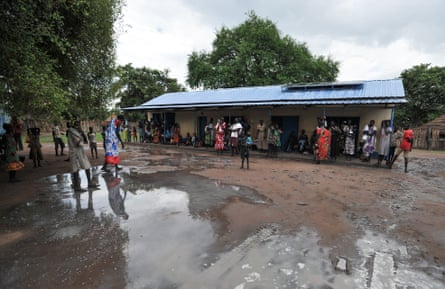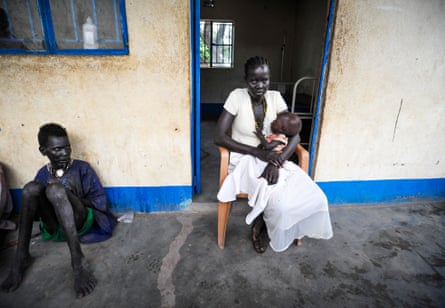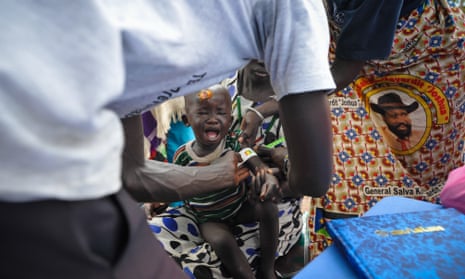The tape measure wound around the arm of two-year old Apiu tells its own story. Under the traffic light system for measuring undernutrition, green means healthy, amber is for “at risk”. Apiu is deep in the red zone: seriously malnourished. South Sudan is grappling with famine and severe hunger.
Now, despite a heavy UN presence and the efforts of many of the world’s largest organisations, delivering life-saving aid is about to become more difficult. After rains failed last year across the Horn of Africa, now they have started to fall on to the parched, dry earth. Soon, large parts of the country will be inaccessible to all vehicles but helicopters.
At the small health centre in Abiriu, in Bahr el Ghazal – the area in north-western South Sudan that the UN has warned is likely to be the next place where famine is declared – the scale of the disaster is clear.

Abandoned by her mother, Apiu has been brought to the clinic in Abiriu by her cousin, Yar. She weighs just 7kg, at least 3kg less than she should at her age. “We haven’t eaten today,” says Yar. “She became sick when [her mother] stopped breastfeeding her and she has been sick since.”
The family is desperately short of food. Apiu’s father, Kau Maciek, 34, has a brain injury caused when a bullet tore a wedge out of the side of his head, and is unable to work. He was shot trying to save his cattle from armed raiders, who took all 20 animals.
Last year’s lack of rain is one reason for the food shortages, but the descent into armed conflict and chaos is the real cause of the crisis in South Sudan, where it has become too dangerous to farm the fields. At least 100,000 people are now affected by famine, with 1 million more at immediate risk. More than 5 million could be affected by the crisis over the next few weeks.
The civil war that erupted in 2013 has escalated from a dispute between President Salva Kiir, from the dominant Dinka ethnic group, and exiled vice-president Riek Machar, an ethnic Nuer, into a full-blown crisis of deadly rivalries, cattle raiding and revenge killings.
The epicentre of the hunger crisis is Unity state, but across the country there are signs that it is spreading.
Monica Aluel, 30, arrives at the clinic with her one-year-old daughter, Adok. Her family can’t work the fields because of the violence, she says. “Last year, we tried to farm but there was no rain and the fighting made it difficult. We ran away from the fighting, and when we went back there was no rain.”

Two weeks ago, she returned to the fields – a two-hour walk north of Abiriu – only to be driven off again. “We tried to cultivate a small piece of land but then there were gunshots,” she says. “I heard the shooting and then others who were cultivating with their guns nearby started shooting back. I picked up my child and ran away, because they kill women too.”
Aluel says she has little food for Adok, who is running a fever. “We have been eating leaves picked from the wild,” she says. “If you get a little money, you can buy a cup of sorghum from the market.”
Sorghum is the staple grain in South Sudan, but even those who have cash are struggling to buy enough of it as rampant inflation has pushed prices in the markets beyond the reach of many people.
With six children to feed, neither Aluel nor her husband have work, though they earn a little money by selling some of the leaves they pick. “I’m not able to do anything and I feel very weak,” says Aluel, joining a queue of women waiting in the shade of a tree to have their children assessed by the medical team.
Abiriu is reached via a potholed, red dirt road running north-west from Rumbek, the capital of Western Lakes state, and passing through checkpoints guarded by armed men. At the sides of the road are clusters of mud huts with conical thatched roofs. A few people are working in the fields. Many people are carrying guns.
David Laat, a community nutrition volunteer at the clinic, says more people are arriving with signs of severe malnutrition. “It is the lack of rain and the insecurity,” he says. “People can’t move around – they might be attacked in their gardens.”
The UK charity Plan International runs an emergency feeding programme through the clinic. It is one of many agencies working with the UN’s World Food Programme to get food to those in need.
Field coordinator Daniel Kon says five clinics treating severely malnourished children have been expected to treat 3,000 cases in a year, but the numbers appear to be rising. The rains will make it difficult to move food aid on the roads, he says.
Apath Majon has brought in her 17-month-old daughter, Cholok, hoping she will be given Plumpy’nut, the peanut-based therapeutic paste. “My child is sick. She is vomiting and has fever. She is not eating,” says Majon, who is 19. “Life is terrible now for both of us. My child is sick and we don’t have food.”

Daniel Chol, a volunteer, tightens a tape measure around the arm of another child. “They are very malnourished and we have got about 15 cases of severe malnutrition,” he says, indicating the red zone of the tape measure.
A boy of 15, who gives his name as John, has brought along his sick five-year-old sister, Adit. “Children don’t have enough food because the criminals want to kill you in the gardens,” he says.
“Last year they came and took my cows. I was sleeping in the garden and the cows were eating near me and the thieves had guns and they shot and I was afraid. I ran away because I didn’t have a gun. We have no cows now. There is no food and no money.”

Comments (…)
Sign in or create your Guardian account to join the discussion